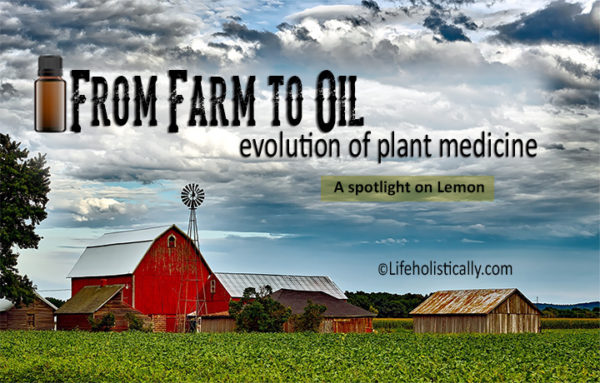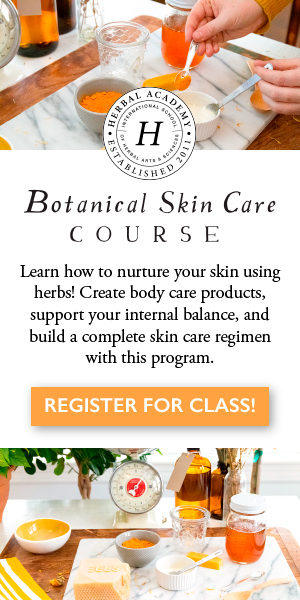The essential oils that we know and love are derived from plants, but this does not necessarily mean that the therapeutic benefits or uses from the plant to essential oil are the same. In many cases, this does not hold true. There are many recipes online utilizing essential oils that do not honor chemistry and do not focus on safe use. Sustainability is also a massive concern as more and more people are stepping into the essential oil community every day. It is not necessary to use oils every day, or in everything. When we see a recipe shared online, we must ask ourselves if it is necessary, shifting the way we currently see these beautiful resources. From Farm to Oil: Evolution of Plant Medicine-A Spotlight on Lemon
My goal in this series of blogs is to celebrate plants in all of their glory. I will walk you through from farm to oil. Uses, limitations, and fun recipes of each botanical will be covered. Within each article, I will discuss the herb, flower, fruit, seed, root, or bark, and finally, the oil. This will be informative and most importantly, FUN!
Lemons, Juicy and Sweet…. (Citrus limon)
The top 5 places in the world where lemons are grown (primarily) are India, Argentina, Spain, and the US (California and Arizona) [1]. When looking at the production of lemons worldwide, the amount of lemons that are grown organically is negligible.
What should we know about conventionally grown lemons? They are sprayed with a lot of pesticides. The pesticides include Imazalil, Thiabendazole, and Sodium O’Phenylphenate (aka Orthophenylphenate), which are all toxic carcinogens as well as endocrine disruptors [2] [3] [4].
So my first very important point in regards to lemons as whole, fruit or essential oil…buy organic. It really is worth the additional cost.
Limonene
The main constituent in a lemon that we look to use for our health is limonene. Limonene has many benefits, and there have been many studies involving this constituent that shows that it does, in fact, have great promise. Limonene is found in the peel of the citrus fruit. Citrus essential oils are either steam-distilled or cold-pressed and will contain a high amount of limonene.
Now, before your mind goes down the rabbit hole, as you can easily find misinformation online in regards to lemon essential oil, we need to address the method of use from fruit to oil, as that oftentimes is where the message gets lost in translation when it comes to this juicy fresh citrus fruit.
Antioxidants
We all want to obtain antioxidants in our diets. Antioxidants devour free radicals. Now, it is important to understand that if we are breathing oxygen, we are creating free radicals, so reality is important too. So…free radicals…in small quantities, not a huge concern, but in excess they will accelerate aging and can lead to all sorts of negative health problems. And since we are being bombarded from all sides with pollution of some sort, we need our liver performing optimally at all times. Consuming foods rich in antioxidants will go a long way towards your optimal health.
Enter lemons, which are very rich in antioxidants, due to both the limonene content as well as the vitamin C content. Thoroughly washing your organic lemons and placing a slice in your water every day is quite healthy, or go one step further. Use the juice of a ½ a lemon in a tall glass of water and you have obtained 25% of your recommended daily allowance (RDA) of vitamin C [5]. Did you think one step further meant place the essential oil in your water? Well, you will never hear that advice from me, more on that shortly. Just remember to take care of the enamel on your teeth if you drink lemon juice in your water daily, as lemons are very acidic in nature. Rinsing well with water after your drink is a good precautionary measure.
Using the Fruit
Want a sweet treat without the guilt? This is a perfect summery treat, one that a friend recommended I try when she saw a bowl of organic lemons on my counter.
Raw Lemon Meltaways
Makes about a dozen (unless you opt for the larger silicone cups)
*I usually triple this recipe and keep some in the freezer
Adapted from DETOXINISTA
Ingredients:
Raw cashew butter 1/2 cup
Freshly squeezed lemon juice 3-4 tablespoons
Raw honey 2 tablespoons
Coconut oil, melted 3 tablespoons
Pinch pink Himalayan sea salt
Lemon zest from the fresh squeezed lemon 2 teaspoons
Mini paper baking cups (I prefer these silicone cups)
Directions: Mix until smooth and creamy and pour evenly into baking cups on flat cookie sheet. Sprinkle the zest over the top. Place in freezer for 30-45 minutes. Serve frozen, they will ‘melt’ at room temperature.
Lemon Strawberry Mint Popsicles
Adapted from LiaGriffith
These molds are just perfect, and BPA free
Warm water 1 cup
Cold water 1 cup
Raw honey 1/2 cup
Mint leaves, 5-6 sliced in thin strips
Lemon juiced 1
Strawberries, thinly sliced
Warm one cup of your water on the stove to melt the raw honey. Add to a stainless steel or glass bowl to cool quickly (add a few pieces of mint to the warm water). When cooled, add the rest of the water and lemon juice.
Place the strawberry slices and mint evenly in your molds, and pour your liquid mixture in. Freeze.
These are so incredibly delicious, without the unhealthy sugars or food coloring.
I encourage you begin to think more about where you can use the nutrient dense fruit before reaching for the essential oil.
When the Essential Oil is Helpful
We can utilize the essential oil to bounce back from illness much quicker alongside quality nutrition, hydration, and rest. Try this blend in a diffuser:
Immune Strong
Lemon (Citrus limon) 5 drops
Palmarosa (Cymbopogon martini) 3 drops
Tea Tree (Melaleuca alternifolia) 1 drop
Lavender (Lavandula angustifolia) 1 drop
This amount of drops is suitable for a 400ml water reservoir diffuser. Adjust accordingly for your diffuser.
Citrus Burst Foaming Hand Soap (Approximately 1.5% dilution)
When looking at formulating hand soap, there is a safe way and an unsafe way. If you do not add some type of preservative, you will grow mold and other nasties in your pump bottle. I like to be crunchy and green whenever possible, but safety can easily trump that in specific cases. This is one of these cases.
In a foaming pump bottle (8 oz), fill halfway with distilled water (always add the water before the soap). Next add castile soap, leaving a good inch at the top of the bottle, you’ll need to leave ample space to put on pump top without causing spillage.
Now add:
Lemon Steam-distilled (Citrus limon) 30 drops
Orange sweet (Citrus sinensis) 25 drops
Mandarin red (Citrus reticulate) 15 drops
Carrier oil of your choice ½ teaspoon (helps to emulsify and prevent skin drying)
AMTicide® Coconut [6] Preservative 1 teaspoon
Cover and shake. This smells amazing, will not leave your hands dry, but will leave them clean and germ-free, safely.
Smell the Lemon
The smell of lemon is so incredibly uplifting, so much so that it is an oil of choice (one of a few) in oncology departments to improve quality of life, and to greatly reduce anxiety in patients. This is done in a professional setting, where the essential oils are treated just like medicine, as that is what they are. If you would like to read the study, I have uploaded it so that you can read it in full here.
To be frank, this shows us that essential oils are being used in a hospital setting as complementary care, not a cure for cancer that is shared so often in social media. There have been promising studies in Petri dishes, outside of the human body (in vitro), which is definitely promising. I hope the future is bright in this area, but the reality is, we are not there yet.
Lemon Essential Oil Misconceptions
There are two really big misconceptions that I want to briefly talk about, and provide resources for further reading.
The first ‘myth’ is stating that we can and should be placing drops of lemon essential oil in our water to drink daily. Some suggest a drop, some much more. Is this really logical?
Essential oils are lipophilic, also called non-polar substances, but they are not actually fats. Water, on the other hand, is polar [7]. When looking at things from a chemistry angle, when you have one non-polar substance and one polar substance, it is like a bad date, they cannot get away from each other quickly enough. They stay separate, trying adamantly not to touch. Unlike the dating scene, opposites do not attract here. The oils will sit on top of the water, no matter how vigorously you mix it, or the temperature of the water. Chemistry is chemistry. Learn more about essential oil chemistry, here.
Many people are drinking their essential oils, and this is very unfortunate, as the risk is not fully understood. Why? Long-term studies are not yet available. The reason is that this is a relatively new recommendation, albeit a very prevalent one, so I feel the evidence will begin to show itself in time. In the meantime, are you willing to be part of the experiment?
I firmly stand by the fact that essential oils do not belong in a glass of water without an emulsifier, period.
The second misconception and the reason why it is stated to put essential oils in our glass of water is that essential oils contain nutrients, in the case of Lemon, the claim is often vitamin C.
According to the Oxford Dictionary, a nutrient is “A substance that provides nourishment essential for the maintenance of life and for growth” [8].
The Oxford Dictionary further states that a supplement is “A substance taken to remedy the deficiencies in a person’s diet” [9].
A few key points in regards to this topic are:
1. Steam distillation of plant matter occurs at approximately 100 °C/212 °F [10].
2. Vitamins degrade at very specific temperatures. Vitamin C, for example, degrades right around 70 °C [11]. Notice that this is 30° cooler than the temperature in which plants are distilled.
3. Lemon essential oil is not providing us with anything that we are missing from our daily diet (since there is no Vitamin C present), therefore is not a supplement.
What about the cold-pressed variety you ask? Because the cold pressed variety of essential oil is not performed under heat, it is fair to say that some vitamin C could be present in the oil, although evaporation of the volatile nutrient will definitely come into play here are well. It is very important to remember though, the amounts will be insignificant, definitely not anything to write home about. If you are looking to obtain vitamin C as a true supplement, please consider the fruit.
I know that these are only bits and pieces of a very important puzzle, therefore, I ask that you please take the time to read my detailed article on essential oils and nutrients, here.
Closing
When we take from the earth for nutrition, sustenance, and healing, it is important that we always consider not only the impact of our use but on giving back. In an ideal world, if we all gave back a little bit more than we take, the impact would be massive.
If you are placing lemon essential oil in your water every day, think first and foremost of the possible health implications of this. Always use a critical eye to consider what you were previously told may be flawed. Is further unbiased research needed on your part? Are using these resources every day in this manner supportive of the sustainability of essential oils? Could we utilize the real fruit for a much safer, nutrient-rich alternative? I think the answer to this is a resounding YES!
We need to begin to shift the way we currently see these beautiful resources, for the continued future success of natural healing.

Like so many practices in life, I encourage you to become educated on the proper use of essential oils. When using them, please do so cautiously, understanding that there is often misinformation on the internet. You can be assured that I support only educated and proven resources. While essential oils should not be feared they should be respected and used properly to ensure the safety of the individuals using them.
Please note that I am not a medical practitioner. The content of this website is provided for general informational purposes only and is not intended as, nor should it be considered a substitute for, professional medical advice. Do not use the information on this website for diagnosing or treating any medical or health condition. If you have or suspect you have a medical problem, promptly contact your professional healthcare provider. By using this website, you assume full responsibility and liability for your own actions.
References
[1] Lemon Growing in the Florida Home Landscape. Retrieved from http://edis.ifas.ufl.edu/hs402
[2] Imazalil http://www.pesticideinfo.org/Detail_Chemical.jsp?Rec_Id=PC33040#Toxicity
[3] Thiabendazole http://www.pesticideinfo.org/Detail_Chemical.jsp?Rec_Id=PC34581#Toxicity
[4] O-PHENYLPHENATE http://scorecard.goodguide.com/chemical-profiles/summary.tcl?edf_substance_id=132-27-4
[5] Benefits of drinking lemon water. Retrieved from https://www.medicalnewstoday.com/articles/318662.php
[6] AMTicide® Coconut. Retrieved from http://www.lotioncrafter.com/amticide-coconut.html
[7] Polar vs Non-Polar Molecules: What you Need to Know. Retrieved from https://blog.udemy.com/polar-vs-non-polar/
[8] Definition of a Nutrient. Retrieved from https://en.oxforddictionaries.com/definition/nutrient
[9] Definition of a Supplement. Retrieved from https://en.oxforddictionaries.com/definition/supplement
[10] Distilling Aromatic Plants. Retrieved from https://aromaticstudies.com/distilling-aromatic-plants/
[11] Rahmawati, S., Bundjali, B. Kinetics of the Oxidation of Vitamin C. Retrieved from http://www.researchgate.net/publication/228484005_KINETICS_OF_THE_OXIDATION_OF_VITAMIN_C
Resources
Sustainability Issues https://naha.org/explore-aromatherapy/sustainability-issues/
The Environmental Impact of Essential Oils http://www.earthisland.org/journal/index.php/elist/eListRead/the_environmental_impact_of_essential_oils/
BEFORE YOU GO! Remember to sign up for my FREE Facebook group! Hang out with me and THOUSANDS of other Essential Oil lovers looking to learn, click on to join Real Essential Oil Education Group!
Check out my FREE offer below!
[et_bloom_inline optin_id=optin_3]







